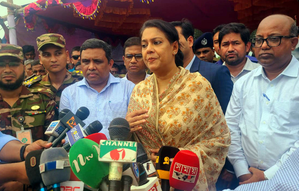Share

DHAKA — Syeda Rizwana Hasan, the advisor on environment and water resources in the Muhammad Yunus-led interim government, said on Wednesday that Bangladesh will soon engage in negotiations with India regarding its water rights and share of the common rivers.
"The negotiations will be held after considering public opinion and the outcomes of the talks will be shared with the people," Hasan said while speaking at a seminar titled 'Bangladesh's Fair Share of Water in Shared Rivers' at Pani Bhaban in Dhaka to mark World Rivers Day.
During the event, she emphasised that while the issue of sharing international river waters is "complex", the exchange of essential information, such as rainfall data and the location of structures, is critical and should not be politicised, The Daily Star reported.
"Sharing rainfall data is a humanitarian issue. Necessary data should be given for saving lives. Bangladesh's claims will be made clearly and strongly," the Advisor was quoted as saying by the daily.
She also mentioned that a country cannot go to the international court unilaterally on such issues and both nations must be involved.
Immediately after the formation of the interim government, Hasan had stated that Dhaka would engage in discussions with New Delhi regarding shared rivers, including the Teesta.
"Just as West Bengal's Mamata Banerjee considers her own people's interests, we will also take into account the needs of our people when making decisions about the Teesta project," she told journalists following a meeting with Abdoulaye Seck, the World Bank's Country Director for Bangladesh, at the ministry's office on August 21.
"The interim government may approach the international stage, if necessary, while maintaining friendly relations with India," she had said then.
A few days later, India had slammed fake videos and rumours - mostly originating from Bangladesh - regarding Farakka barrage gates which are opened during the monsoon for smooth passage of flows of River Ganga, calling them as an attempt to create "fear mongering" and "misunderstanding" between the two neighbouring countries that should be "firmly countered" with facts.
"We have seen media reports of the opening of Farakka barrage gates that will allow the flow of over 11 lakh cusecs of water downstream of the river in its natural course into the Ganga/Padma river. This is a normal seasonal development that takes place due to increased inflow from heavy rainfall in the Ganga river basin catchment areas upstream," said Ministry of External Affairs (MEA) spokesperson Randhir Jaiswal on August 26.
"It is to be understood that Farakka is only a barrage and not a dam. Whenever, water level reaches the pond level, whatever inflow comes that passes. It is merely a structure to divert 40,000 cusecs of water into the Farakka canal that is carefully done using a system of gates on the main Ganga/Padma river, while the balance water flows into the main river to Bangladesh. Data, as per protocol, is shared with the concerned Joint River Commission officials in Bangladesh on a regular and timely basis. It has been done this time as well," he added.
The 'India-Bangladesh Shared Vision for Future: Enhancing Connectivity, Commerce and Collaboration for Shared Prosperity' released on June 22 this year during former Bangladesh Prime Minister Sheikh Hasina's New Delhi visit had recognised the importance of water resource management in bilateral relationship.
"We will continue to engage in prioritizing the exchange of data and formulating the framework for interim water sharing based on the recommendations of the Joint Rivers Commission. We welcome the formation of a Joint Technical Committee to initiate discussions for the renewal of the Ganges Water Sharing Treaty of 1996. As part of our development cooperation, we will also undertake conservation and management of Teesta River inside Bangladesh with Indian assistance within a mutually agreed time frame," the document mentioned.
India and Bangladesh share 54 rivers, of which 7 rivers were identified for developing the framework of water sharing agreements on priority.
The Joint Rivers Commission (JRC) of India and Bangladesh was constituted in 1972 as a bilateral mechanism to address issues of mutual interest on common/border/transboundary rivers.
According to the MEA, one of the important areas of cooperation, where India has been assisting Bangladesh, is sharing of real time flood data. India has also extended the period of flood data sharing beyond October 15 to help Bangladesh address unforeseen flood events.
Over the past few weeks, Hasan has also mentioned the interim water-sharing agreements on Kushiyara and Feni rivers, saying that there is an "issue" with the renewing of the Ganga Treaty and discussions with India can be held on more uniform rivers.